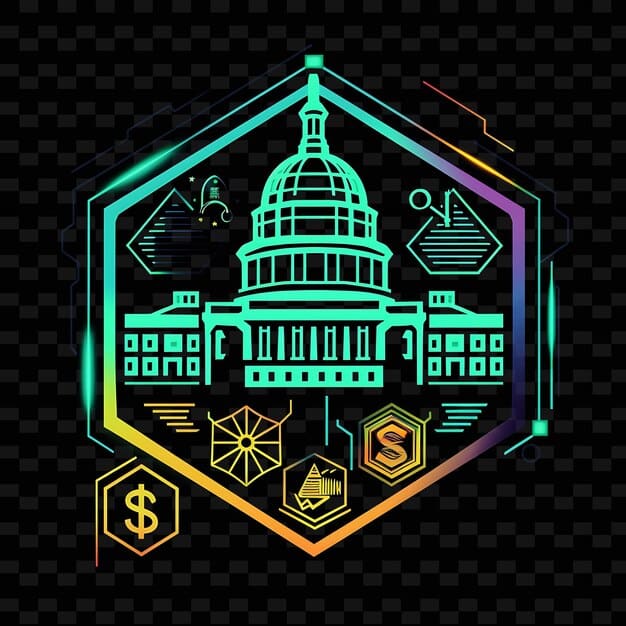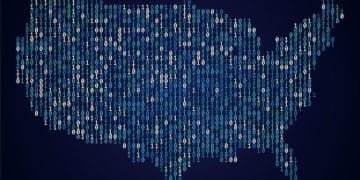The Impact of US Policy on AI Development and Regulation

US policy significantly shapes the trajectory of artificial intelligence (AI) development and regulation, influencing innovation, ethical considerations, and global competitiveness.
The surge in artificial intelligence (AI) has prompted nations worldwide to consider its potential impacts. In the United States, the impact of US policy on artificial intelligence (AI) development and regulation is a critical factor shaping the future of this transformative technology. Understanding these policies is crucial for anyone involved in or affected by AI.
Understanding the Landscape of US AI Policy
The US approach to AI policy is multifaceted, involving various government agencies and legislative efforts. This framework seeks to balance fostering innovation with addressing potential risks and ethical concerns associated with AI.
Several key agencies play a role in shaping AI policy. These include the White House Office of Science and Technology Policy (OSTP), the National Institute of Standards and Technology (NIST), and various congressional committees.
Key Agencies Involved
The OSTP coordinates AI-related activities across the federal government, while NIST focuses on developing standards and metrics for AI technologies.
Legislative Efforts
Congress has also been actively involved, introducing bills and holding hearings to address issues ranging from AI ethics to workforce development.
- The AI in Government Act: Aims to improve AI adoption and innovation within federal agencies.
- The Algorithmic Accountability Act: Focuses on ensuring fairness and transparency in automated decision-making systems.
- National AI Initiative Act: Enhances AI research and development through increased funding and coordination.
In conclusion, the US AI policy landscape is evolving, with various stakeholders contributing to shaping its direction. This collaborative effort aims to ensure that AI benefits society while mitigating potential harms.

The Economic Implications of AI Policy
AI’s economic implications are considerable, and US policy plays a pivotal role in determining how these benefits are realized. By influencing investment, innovation, and workforce development, AI policy can significantly impact the nation’s economic competitiveness.
One of the primary goals of US AI policy is to promote economic growth. This involves incentivizing investment in AI research and development, fostering innovation in AI applications, and ensuring that the workforce is equipped with the skills needed to thrive in an AI-driven economy.
Investment and Innovation
Government funding for AI research and tax incentives for AI companies can spur technological advancements and create new economic opportunities.
Workforce Development
Educational programs and training initiatives are essential to prepare workers for the jobs of the future and mitigate potential displacement caused by automation.
- Job Creation: AI can lead to the creation of new jobs in areas such as AI development, data science, and AI-related services.
- Productivity Gains: AI can enhance productivity across various industries by automating tasks and improving decision-making.
- Economic Competitiveness: A strong AI sector can boost the US’s competitive edge in the global economy.
In summary, US AI policy has a profound impact on the nation’s economic trajectory. By strategically addressing investment, innovation, and workforce development, policymakers can harness the transformative potential of AI for sustained economic growth.
Ethical and Social Considerations in AI Regulation
As AI technologies become more pervasive, ethical and social considerations have moved to the forefront of policy discussions. US policy frameworks must address issues such as bias, privacy, and accountability to ensure that AI is developed and deployed responsibly.
One of the key challenges in AI regulation is mitigating bias in algorithms. AI systems can perpetuate and amplify existing societal biases if they are trained on biased data. Addressing this requires careful attention to data collection, algorithm design, and ongoing monitoring.
Addressing Algorithmic Bias
Developing methods for detecting and mitigating bias in AI systems is crucial for ensuring fairness and equity.
Protecting Privacy
AI systems often rely on vast amounts of data, raising concerns about privacy. Policies must establish clear guidelines for data collection, storage, and use to protect individuals’ privacy rights.
- Transparency: Promoting transparency in AI systems can help build trust and accountability.
- Accountability: Establishing clear lines of accountability for AI decision-making is essential for addressing potential harms.
- Fairness: Ensuring that AI systems are fair and do not discriminate against any group is a fundamental ethical imperative.
In conclusion, ethical and social considerations are central to effective AI regulation. Addressing bias, privacy, and accountability requires a comprehensive and proactive approach from policymakers.
The Global AI Landscape and US Policy
The development and regulation of AI are global endeavors, and US policy must take into account the actions of other countries. The US competes with nations like China and the European Union in AI research, development, and deployment.
One of the key aspects of the global AI landscape is the competition between the US and other countries, particularly China. China has made significant investments in AI and has emerged as a major player in the field. US policy must address this competition to maintain its leadership in AI.
International Collaboration
Collaborating with other countries on AI research and standards can help advance the field and ensure that AI benefits humanity as a whole.
National Security Implications
AI has significant national security implications, and US policy must address these concerns. This includes protecting AI technologies from being used for malicious purposes and ensuring that the US military maintains its technological edge.

- Data Governance: Different countries have different approaches to data governance, which can impact AI development.
- Ethical Frameworks: Establishing common ethical frameworks for AI can help ensure that AI is developed and used responsibly around the world.
- Trade and Investment: Policies related to trade and investment in AI can impact the flow of AI technologies and talent across borders.
In summary, US AI policy must be informed by the global AI landscape. By fostering international collaboration, addressing national security concerns, and promoting common ethical frameworks, the US can maintain its leadership in AI and ensure that AI benefits the world as a whole.
Future Trends in AI Policy
AI technology is rapidly evolving, and US policy must adapt to keep pace. Several trends are likely to shape AI policy in the coming years, including increased automation, the rise of AI ethics, and the growing importance of cybersecurity.
One of the key trends in AI policy is the increasing focus on automation. As AI systems become more capable, they are likely to automate more tasks, leading to both economic opportunities and potential workforce disruptions. Policy must address these challenges by promoting education and training programs and supporting workers who are displaced by automation.
Increased Automation
Preparing for the impacts of increased automation requires proactive policy measures.
AI Ethics
The ethical implications of AI are receiving increasing attention, and policy must address these concerns by promoting transparency, accountability, and fairness in AI systems.
- Explainable AI: Developing AI systems that can explain their decisions can help build trust and accountability.
- Cybersecurity: Protecting AI systems from cyberattacks is essential for ensuring their reliability and security.
- Regulation of AI in Specific Sectors: Different sectors, such as healthcare and finance, may require specific AI regulations to address unique risks and challenges.
In conclusion, the future of AI policy will be shaped by trends such as increased automation, the rise of AI ethics, and the growing importance of cybersecurity. By proactively addressing these challenges, policymakers can ensure that AI benefits society while mitigating potential harms.
Challenges and Opportunities in AI Governance
Governing AI presents both challenges and opportunities for the US. Striking the right balance between promoting innovation and mitigating risks is essential for realizing the full potential of AI.
One of the key challenges in AI governance is the need to balance innovation and regulation. Overly strict regulations can stifle innovation and hinder the development of new AI technologies. However, too little regulation can lead to ethical and social harms.
Balancing Innovation and Regulation
Finding the right balance between promoting innovation and mitigating risks is essential for effective AI governance.
Public Engagement
Engaging the public in AI policy discussions can help ensure that policies reflect societal values and concerns.
- Data Quality: Ensuring the quality and reliability of data used to train AI systems is crucial for their performance and fairness.
- Interoperability: Promoting interoperability between different AI systems can help foster innovation and competition.
- International Cooperation: Collaborating with other countries on AI governance can help ensure that AI is developed and used responsibly around the world.
In summary, governing AI presents both challenges and opportunities for the US. By striking the right balance between promoting innovation and mitigating risks, the US can realize the full potential of AI and ensure that it benefits society as a whole.
Conclusion
In conclusion, the impact of **US policy on artificial intelligence (AI) development and regulation** is a complex and evolving issue. By strategically addressing investment, innovation, ethical considerations, and international collaboration, policymakers can shape the future of AI in a way that benefits both the US and the world.
| Key Point | Brief Description |
|---|---|
| 🚀 Innovation Boost | US policy aims to foster AI advancements. |
| 🛡️ Ethical Concerns | Regulations address bias and privacy in AI use. |
| 🌍 Global Competition | US competes with China and EU in AI development. |
| 💼 Economic Impact | AI policies influence job creation and productivity gains. |
Frequently Asked Questions
▼
The primary goal is to balance fostering AI innovation with addressing potential risks and ethical concerns, ensuring AI benefits society.
▼
US policy focuses on developing methods for detecting and mitigating bias in AI systems to ensure fairness and equity in decision-making.
▼
AI has significant national security implications, including protecting AI technologies from malicious use and ensuring the US military maintains its technological edge.
▼
The US competes by incentivizing investment in AI research, fostering innovation, and ensuring the workforce is equipped with the necessary AI skills.
▼
Future trends include increased automation, a greater focus on AI ethics, and the growing importance of cybersecurity in protecting AI systems.
Conclusion
In summary, **the impact of US policy on artificial intelligence (AI) development and regulation** is a complex and multifaceted issue. It requires a balanced approach to fostering innovation while addressing ethical concerns and ensuring global competitiveness, ultimately shaping the future of AI for the benefit of society.





